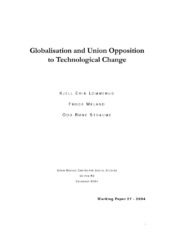| dc.contributor.author | Lommerud, Kjell Erik | eng |
| dc.contributor.author | Meland, Frode | eng |
| dc.contributor.author | Straume, Odd Rune | eng |
| dc.date.accessioned | 2006-06-21T12:24:36Z | |
| dc.date.accessioned | 2020-12-10T06:34:47Z | |
| dc.date.available | 2006-06-21T12:24:36Z | |
| dc.date.available | 2020-12-10T06:34:47Z | |
| dc.date.issued | 2004-12 | eng |
| dc.identifier.issn | 1503-0946 | |
| dc.identifier.uri | https://hdl.handle.net/1956/1347 | |
| dc.description.abstract | We find that trade unions have a rational incentive to oppose the adoption of labour-saving technology when labour demand is inelastic and unions care much for employment relative to wages. Trade liberalisation typically increases trade union technology opposition. These conclusions are reached in a model of international duopoly with monopoly wage setting in one of the countries, and two-way trade. An important stepping stone for the result is to note that even though trade liberalisation means a tougher competitive environment for firms, labour demand tends to increase. We also find that the incentive for technology opposition is stronger in the more technologically advanced country and in the country with the larger home market, complementing earlier explanations for technological catch-up and leapfrogging. | en_US |
| dc.format.extent | 809700 bytes | eng |
| dc.format.mimetype | application/pdf | eng |
| dc.language.iso | eng | eng |
| dc.publisher | Stein Rokkan Centre for Social Studies | eng |
| dc.relation.ispartofseries | 27-2004 | |
| dc.relation.ispartofseries | Working Paper | en |
| dc.title | Globalisation and Union Opposition to Technological Change | eng |
| dc.type | Working paper | eng |
| dc.subject.nsi | VDP::Samfunnsvitenskap: 200 | nob |
